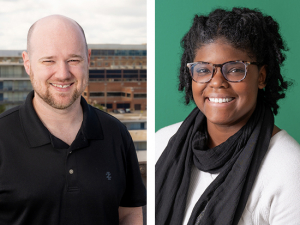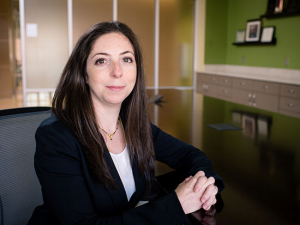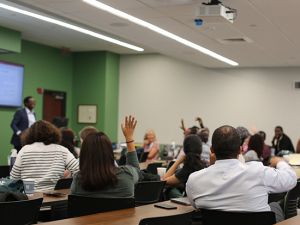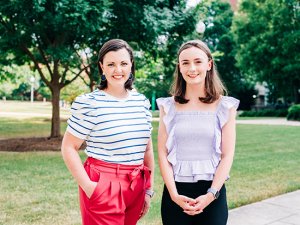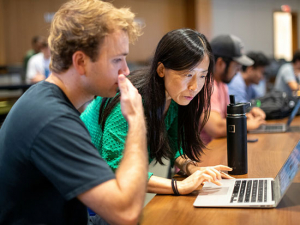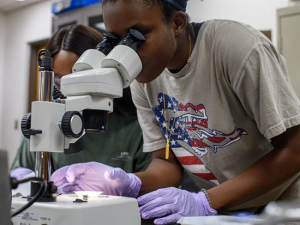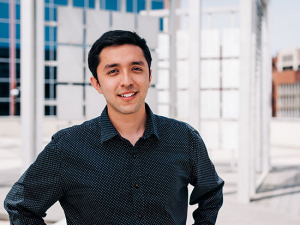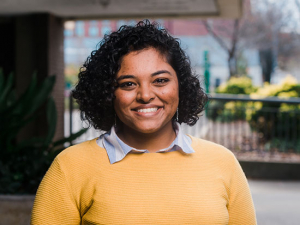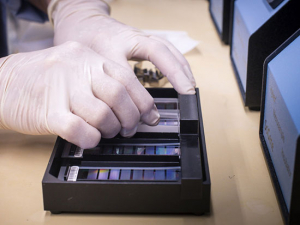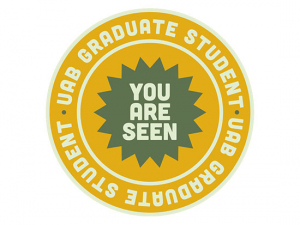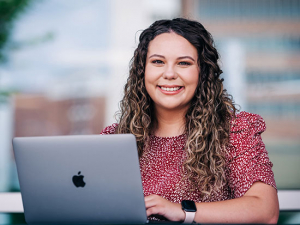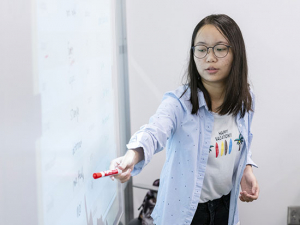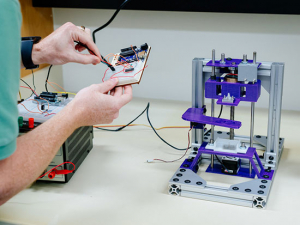 Work will never be the same again.
Work will never be the same again.
In the past few years, employers and employees have had to adapt to the rise of artificial intelligence and automation, a growing awareness of social justice concerns, and the tectonic shifts brought about by the pandemic. But this is nothing new. “The work environment will always change with innovation,” said Lisa Kerr, Ed.D., assistant dean of Professional Studies and Experiential Learning at the UAB Graduate School.
Kerr leads an office of the same name, known as OPSEL, which was launched in 2021 as an expansion of the Graduate School’s Professional Development Program (see below). “Folks are in positions that didn’t exist when they were starting their careers, or their jobs have continued to evolve,” Kerr said. More and more workers find themselves in hybrid jobs that combine multiple skillsets — a manager who is also expected to know how to analyze data, for example. “How can we help workers flex?” Kerr said.
Answering that question is the goal of OPSEL, which was created “to meet the growth that is going on in the Graduate School and in today’s workforce,” Kerr said. Some of that growth is due to the runaway success of the school’s MA/MS Interdisciplinary Graduate Studies (IGS) master’s program, and a new, statewide initiative, the Alabama Advanced, Specialized Skills, Education and Training program, or AL ASSET, is expected to attract even more attention.
The IGS program allows students to earn a customized graduate degree by combining two participating UAB certificate programs with an experiential learning-focused capstone project. AL ASSET was developed to identify competency-based standalone graduate certificates that meet workforce development needs, and to give Alabama graduate schools the opportunity to recognize and accept each other’s certificates. (More below.)
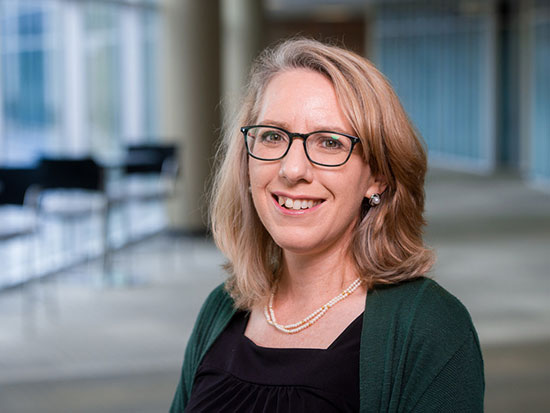 Customized graduate degrees that allow students to combine two participating certificate programs with an experiential-learning focused capstone project help practitioners develop their skills to meet changing job needs, said Lisa Kerr, Ed.D., assistant dean of Professional Studies and Experiential Learning in the Graduate School.In addition to the IGS program, OPSEL includes five graduate certificate programs: Leadership and Professional Development, Research Communication, Research Laboratory Management, Mentoring and Leadership, and the CIRTL Practitioner/Scholar certificate.
Customized graduate degrees that allow students to combine two participating certificate programs with an experiential-learning focused capstone project help practitioners develop their skills to meet changing job needs, said Lisa Kerr, Ed.D., assistant dean of Professional Studies and Experiential Learning in the Graduate School.In addition to the IGS program, OPSEL includes five graduate certificate programs: Leadership and Professional Development, Research Communication, Research Laboratory Management, Mentoring and Leadership, and the CIRTL Practitioner/Scholar certificate.
The first three of those certificates are eligible for the IGS master’s program. So are 20 other participating certificates, and at least five more certificate programs are in development at UAB. “There has been a great deal of interest among faculty” in exploring the creation of new certificates, Kerr said. “The excitement is in realizing that there are whole pockets of people who would benefit from classes we offer. There has been a lot of creativity among our faculty, including interdisciplinary partnerships.”
But what if the certificates a student wants for a specific program are not available at UAB? This is the idea behind the AL ASSET program.
Sharing certificates across the system — and state
“The AL ASSET program is designed to provide learners and professional practitioners the opportunity to stack designated certificates among participating universities throughout the state,” Kerr said. “The AL ASSET program aligns with the Governor’s Office of Education and Workforce Transformation in that every certificate designated as an AL ASSET demonstrates its alignment with competencies of an in-demand career within the state.”
Certificates developed at each institution still go through the usual accreditation and approval process by the Alabama Commission on Higher Education. “Once ACHE recognizes it in their list, then the university can forward that designation for approval and inclusion in AL ASSET,” where it will be reviewed by the Alabama Council of Graduate Deans, Kerr said. “A key consideration for approval is for the certificate provider to demonstrate the workforce competencies that are integrated in the certificate — that this is a practitioner-focused certificate.”
Separately, universities can decide if they will accept AL ASSET certificates from other participating institutions as part of their own interdisciplinary graduate studies programs, through what is known as a collaborative articulation agreement. Once all the schools in the University of Alabama System sign the collaborative articulation agreement, certificates earned at one school will be eligible to stack into degrees at other system schools.
New certificate programs in advising and diversity
One of the first certificates to become part of the AL ASSET program is UAB’s new Academic Advising certificate, which is also the first academic advising certificate available in the state. “There is a lot more to advising than just telling people what classes to take,” Kerr said. “Academic advising is known to really contribute to student success and degree completion.”
The certificate is grounded in the competencies of advising and taught from the perspective of a postsecondary adviser, Kerr explains. “There are courses on advising community college students and transfer students, for example,” she said. “This certificate teaches learners how to be intrusive in their advising in a developmental way.”
Share your thoughts
If you are interested in learning more about OPSEL or starting a discussion, email opsel@uab.edu.
The certificate is open to current academic advisers, at the university level or at the high school level, and to students interested in higher education administration (and UAB’s Higher Education Administration certificate or master’s programs). And there are others who may benefit from the program. “If you are a coach, for example, realizing there are a lot of academic support services around athletes, you may want to understand the processes that students go through as part of your holistic support of your students. This would give you that opportunity,” Kerr said.
Faculty members, who are expected to advise students as part of their teaching, also could benefit from learning best practices in academic advising, Kerr adds. “There are some very clear components of academic advising that serve to best support the student,” she said. “There may be faculty who want to enhance their sense of competency and take a course to supplement their expertise.”
Another new certificate program launching at UAB is focused on Diversity, Equity, Inclusion and Advocacy. “The courses are being taught by doctoral-level practitioners from our Office of Diversity, Equity and Inclusion at UAB,” Kerr said. “The intent is to train students to contribute to a workforce where those concepts are embedded. This program offers a safe space to expand your learning of these issues. We’ve been piloting the initial courses over the past two semesters, and the students have been very positive.” The first new cohort for the program will be admitted in the fall of 2022. As is the Academic Advising certificate, the DEIA certificate program will be submitted for AL ASSET approval, Kerr notes.
Open to ideas, feedback
“This is a great time, if you have ideas of courses or programs that you think might be beneficial to students, whether for credit or in the co-curricular area, to come to us and talk,” Kerr said. “Or maybe you are thinking, ‘I wish there were a certificate in X ...’ We are open to ideas and feedback from students, faculty, staff — whoever it might be. OPSEL is designed to be a dynamic office to support these ideas. If you see a gap in the programming and support offered, we are a safe space where you can come, and we can help flesh out that idea without being committed to anything. I have had some amazing conversations with department chairs and program directors that have generated some great ideas.”
The new Academic Advising certificate is one example, Kerr said: “I was having a conversation with a group of practitioners and colleagues across campus, and some academic advisers were part of that. I got an email 30 minutes later from them, and that grew into a committee of six people who developed a program that is pretty unusual and serves a lot of people.”
Kerr said she is excited by OPSEL’s missions to support student success and professional development while contributing to UAB’s engagement in statewide workforce development efforts: “We are intending to expand our audience, to reach new populations who wouldn’t previously have considered going back to school.”
Building on a strong foundation
The Graduate School’s Professional Development Program launched more than 25 years ago to provide graduate students with co-curricular (that is, non-credit-bearing) training and assistance with career essentials, including help with academic writing, identifying a career path, creating CVs and other job application materials, negotiating job offers, and more.
OPSEL will continue to offer all of that programming and is looking to add even more services based on student and faculty feedback, Kerr said: “We are building on a strong foundation, and these support services and programs the campus is accustomed to are not disappearing.” OPSEL is intended to expand professional development support to practitioners in nearly any field who are seeking training for “this new hybrid workforce,” Kerr said.

